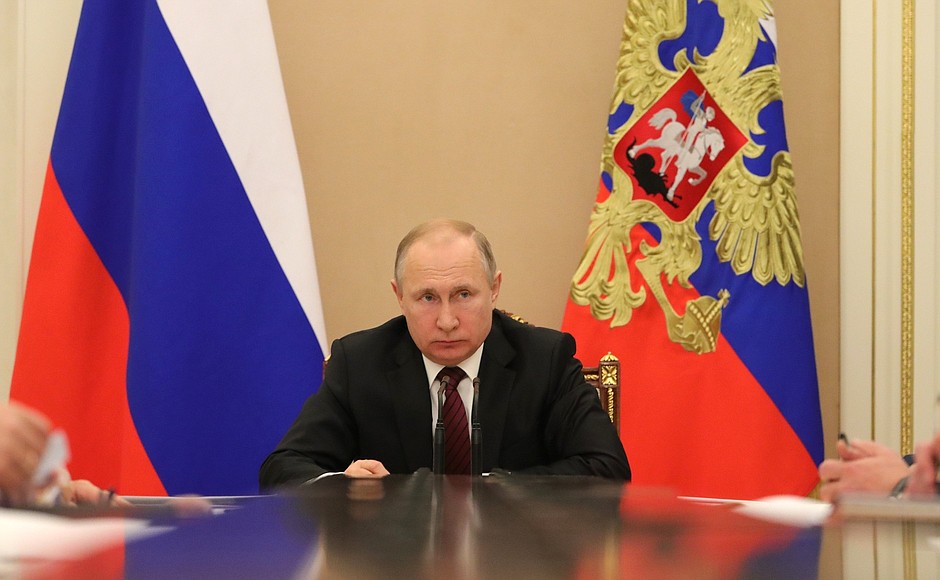 Photo courtesy of the Kremlin
Photo courtesy of the Kremlin
Fake News, Real Consequences
On Monday, Russian President Vladimir Putin signed a set of bills which criminalizes “fake news” and disrespect of the state. According to The Moscow Times, “Online news outlets and users that spread ‘fake news’ will face fines of up to 1.5 million rubles ($22,900) for repeat offenses. Insulting state symbols and the authorities, including Putin, will carry a fine of up to 300,000 rubles and 15 days in jail for repeat offenses.”
The laws give Russian government authorities an unprecedented amount of control over the Russian internet, even as Russia unveils plans to create a secure “intranet” network. According to Radio Free Europe/Radio Liberty, the law outlawing the spreading of fake news “empowers the prosecutor-general and his deputies to determine what constitutes fake news without a court decision, after which the state media and communications watchdog Roskomnadzor would block the site or account.”
Roskomnadzor, the Russian government’s censor, will allow registered websites time to remove content deemed as “fake news,” but websites not registered with Roskomnadzor will be blocked without warning. Fines of up to 1.5 million rubles ($22,900) will be issued to outlets spreading fake news.
When it comes to disrespecting the state, government officials, or Putin himself, violators could face fines of up to 300,000 rubles ($4,705) or 15 days in jail for repeat offenses.
These laws are a part of a larger Russian initiative to enhance government control over the Russian internet, or Runet.
However, the laws have been criticized as being overly restrictive by Putin’s presidential council. They warned that the European Convention on Human Rights (Article 10) does not allow for the restriction of free speech simply on the determination of whether the information is true or not. Putin has clearly rejected their criticism.
Matthew Rojansky, director of the Wilson Center’s Kennan Institute, is quoted by NPR as saying these new laws are notable because the internet “remained a relatively free space for political expression, including oppositional to the regime, even as the state media, and all other forms of media, be it print, or television, or radio, were largely shut down by the state, over the last 20 years.”
The importance of the internet, as Rojansky emphasizes, has remained salient with the Russian people over the years. In April of 2018, mostly young Russians took to the streets of Moscow to protest government efforts to block a popular app called Telegram, which was created by a self-exiled Russian named Pavel Durov.
Government limitations on the internet have also clearly been used as a political tool, such as when popular opposition leader Alexey Navalny’s “Smart Vote” program, which sought to organize opposition groups to defeat United Russia in local elections, was blocked.
This new move by Russia takes things a step forward, or backward, rather, by enabling the government to determine what is truth without a court decision and then threatening those who violate these declarations of truth with legal action.
In conjunction with government actions to limit the outside flow of information into the Russian internet through a government firewall, this move to crack down on unfavorable news coming from inside Russia itself will allow the state to significantly tighten its grip on the web. This is significant not just because these actions may constitute a human rights violation, but also because the free internet has been an incredibly effective opposition tool for leaders like Navalney.
Russia is cracking down on cybersecurity and the internal control of information. The questions for the United States revolve around how this will affect its own cybersecurity, its ability to reach the Russian people via online channels, and the future success of hypothetical offensive cyber operations. Putin’s eager effort to obtain a secure Runet may have implications for future cyberattack plans, as he may be gearing up for retribution. However, Putin may just be looking to protect Russia’s internet amid recent United States efforts to prepare offensive cyberattacks, such as during the November 2018 elections.
International cybersecurity aside, the Russian internet itself will now be heavily monitored, and users will be at the mercy of the Russian government when it comes to what is truth and what is ‘insulting’ to the state.





